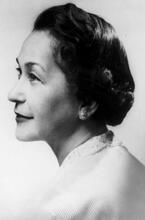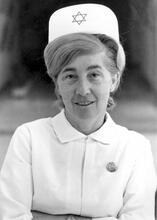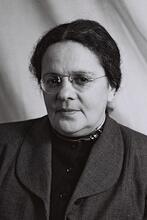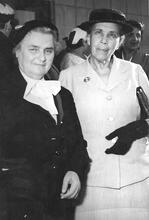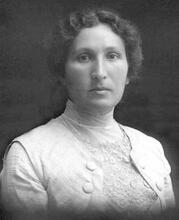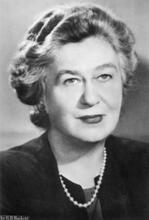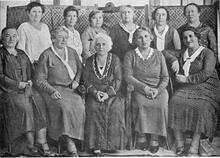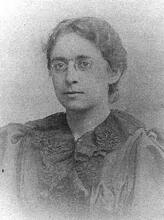Sylva Gelber
Sylva Gelber was born into a Canadian Zionist family and left Canada for Palestine in 1932. A friend introduced Gelber to American Zionist leader Henrietta Szold, who decided to enroll Gelber as the first student in her new School of Social Work in 1933. Gelber was subsequently involved with the Jewish National Council’s Jerusalem welfare bureau, the Hadassah Medical Organization, and British Palestine’s Department of Labor. Gelber left Palestine in 1948 after her romantic involvement with a British officer soured her Jewish friendships. Upon returning to Canada, she became a distinguished political advocate for women’s rights. Between 1968 and 1975 she served as director of the Women’s Bureau of the Canada Department of Labor and as the Canadian representative to the UN Commission on the Status of Women.
Family & Education
The first graduate of the Social Work School of the Va’ad Le’umi, now the Baerwald School of Social Work of the Hebrew University, Sylva Gelber was born into a Zionist family. Her father was Louis Gelber (1878–1968) and her mother Sara Gelber née Morris (d. 1954). Louis and his brother Moses (1876–1940) were successful textile wholesalers who had immigrated to Toronto in 1896 from the town of Berezhany in Austrian Galicia. They and their children were among Canada’s foremost supporters of Jewish nationalism. Gelber’s cousin Edward (1904–1971), Moses’s son, was a lawyer and a rabbi who devoted his life to serving the Jewish community. Among other posts, he was president of the Zionist Organization of Canada (ZOC) and co-chair of Israel Bonds of Canada for a number of years before moving to Israel with his family in 1956. Gelber had four brothers: Lionel (1907–1989), who acted as political advisor to the Jewish Agency Office in New York between 1945 and 1948; Marvin (1912–1990), who, in those same years, worked as a lobbyist urging the Canadian government to support the nascent state of Israel and over the years was involved with the Palestine Economic Corporation, the Canadian Friends of the Hebrew University, and the ZOC; Arthur (1915–1998), who was a president of the Toronto Zionist Council, a founder of the Canada-Israel Cultural Foundation, and active in other Zionist organizations; and Sholome (1918-2001), an ordained rabbi who assisted in organizing “illegal” immigration to Palestine while working with UNRWA in the Bergen-Belsen concentration camp. Gelber never married.
Gelber was educated at Havergal Ladies College in Toronto, an exclusive girls’ school that admitted few Jews in the 1920s. Summers were spent at Camp Modin in Maine, an early Jewish and Hebrew educational camp, the alumni of which included members of the American-Jewish communal elite. Her application to Barnard College in 1929 was rejected because “the Jewish quota was already filled.” She took courses at Columbia, New York University, and the University of Toronto that did not lead to a degree. After a stint as a columnist for the Jewish Standard, a Toronto Zionist publication then edited by Meyer Weisgal (1894–1977), she left for Palestine in 1932.
Yishuv Years
Upon arriving in Palestine, Gelber spent her first year there “meandering” around the land. In 1933 she decided to enter the world of wage earning and become an English tutor. Around this time, Gelber’s Camp Modin friend Libby Berkson decided to establish an American-style tearoom in Jerusalem. Berkson offered Gelber employment at the tearoom, named Al Cos Te—Over a Cup of Tea. After a few days of waitressing, Gelber was transferred to a cashier position. She was happy to be earning a wage, but not enthusiastic about the kind of employment—for her, it “hardly met my expectations of participating in the upbuilding of the Homeland” (memoir, 45).
At this time Gelber also connected with Rose Jacobs, who had also spent time at Camp Modin and who was now the president of Hadassah in the United States. It was Jacobs who suggested to Gelber that she work as a volunteer for the Jerusalem Welfare office. Gelber expressed interest, and Jacobs set up a meeting between her and Henrietta Szold. This first meeting was soured for Gelber by Szold’s tirade against the Canadian leaders of Hadassah. Because of the intensity of Szold’s accusations, Gelber was surprised when Szold suggested she report at eight o’clock the following morning to the welfare bureau in Jerusalem.
Despite having no background in family casework, Gelber began working as a family case worker in the morning and a tearoom cashier in the evening. She also began to visit Szold every Friday afternoon. At that time Szold was most concerned with the School of Social Work, which she hoped would establish a scientific approach to social work in the Yishuv. Of Szold’s next offer to her, Gelber wrote the following: “When Miss Szold had offered to make it possible for me to work full time at the Kehillah [welfare office], she obviously had in mind the need to find some young guinea pigs for the new school” (memoir, 55). Nevertheless, Gelber became the first student to be formally inducted into the student body in 1933. A few years later, Gelber received the School’s first Social Work Diploma. After graduation, she was given responsibility for operating the WIZO childcare office, but soon returned to the welfare office.
Gelber was thus involved in the capacity of family counselor and probation officer with the Va’ad Le’umi Social Work Bureau from 1932 to 1937. Gelber also worked as a medical social worker with the Hadassah Medical Organization from 1937 to 1942. From 1942 to 1948 she worked for the (British) Government of Palestine Department of Labor. Throughout these years she was a member of a small group of influential Jerusalemites of North American origin that included Szold and Judah Magnes (1877–1948), the president of the Hebrew University.
Over time, Gelber drew apart from her former friends in the yishuv. To some extent, ideological differences caused the estrangement. But her romantic involvement with a British official was also a factor. In the charged atmosphere of the struggle for Jewish statehood waged against the British and the Arabs, doubts arose regarding Gelber’s loyalties. She returned to Canada in 1948 soured on the Zionist enterprise.
Canadian Career & Legacy
Gelber had left a country in which few women and no Jews could enter the public service. She returned at the moment when Canada was opening up, in part because of embarrassment regarding the country’s actions during the Holocaust. Gelber embarked upon a career of distinguished public service. From 1950 to 1968 she worked as a health insurance consultant to the Government of Canada Department of National Health and Welfare. From 1968 to 1975 she served as director of the Women’s Bureau of the Canada Department of Labor, and from 1970 to 1974 she was the Canadian representative to the UN Commission on the Status of Women. Gelber was especially celebrated and gained national recognition for her role as an advocate of women’s rights. She was a pioneer in the introduction of equal-pay legislation, maternity leave, and women’s pension benefits into Canadian politics. Concurrently she served as special advisor to the Canadian UN General Assembly delegation and as Canadian delegate to International Labor Organization conferences.
Gelber held honorary degrees from Queen’s, Memorial, Guelph, Trent, and Mount St. Vincent’s universities. She was awarded the Canadian Centennial Medal in 1967 and made an officer of the Order of Canada in 1975. She served on the boards of governors of Trent University and the Canadian Human Rights Foundation. In 1978 she served as vice-president of the latter. She was also on the board of the Canada-Israel Cultural Foundation, which her brother, Arthur, had helped to establish.
One of Gelber’s greatest passions was music. She was founder and president of the Sylva Gelber Music Foundation, which provides financial assistance to young Canadian classical musicians. She also endowed an award for talented students at the Rubin Academy of Music and Dance in Jerusalem through the Canada-Israel Cultural Foundation. Gelber wrote a memoir of her Yishuv experiences called No Balm in Gilead in 1989. She died in Ottawa in 2003.
Selected Works
No Balm in Gilead: A Personal Retrospective of Mandate Days in Palestine. Montréal: McGill-Queen’s University Press, 2014.
The Rights of Man and the Status of Women. Ottawa: Canada Women’s Bureau, Dept. of Labor, 1973.


